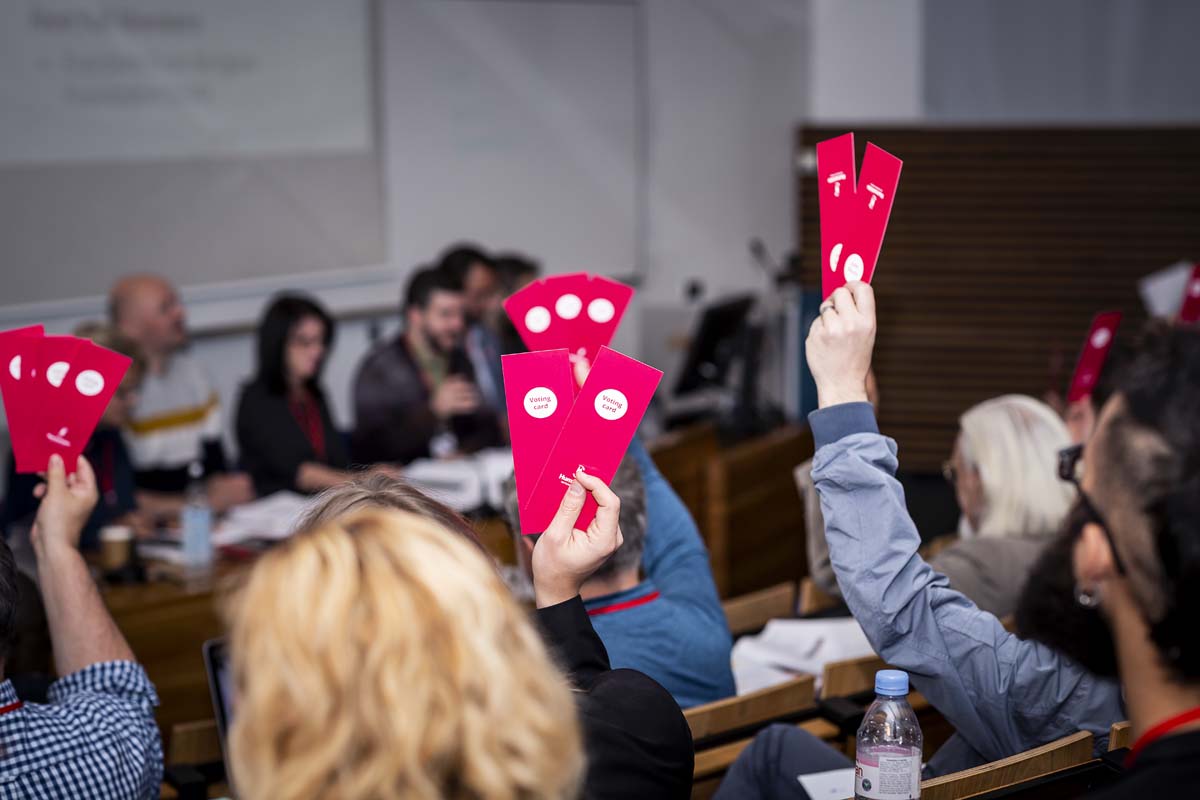
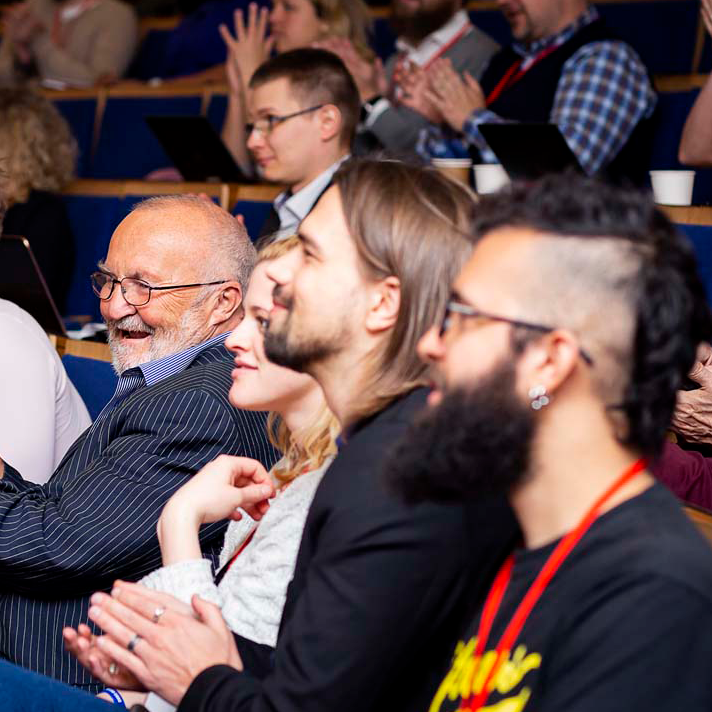
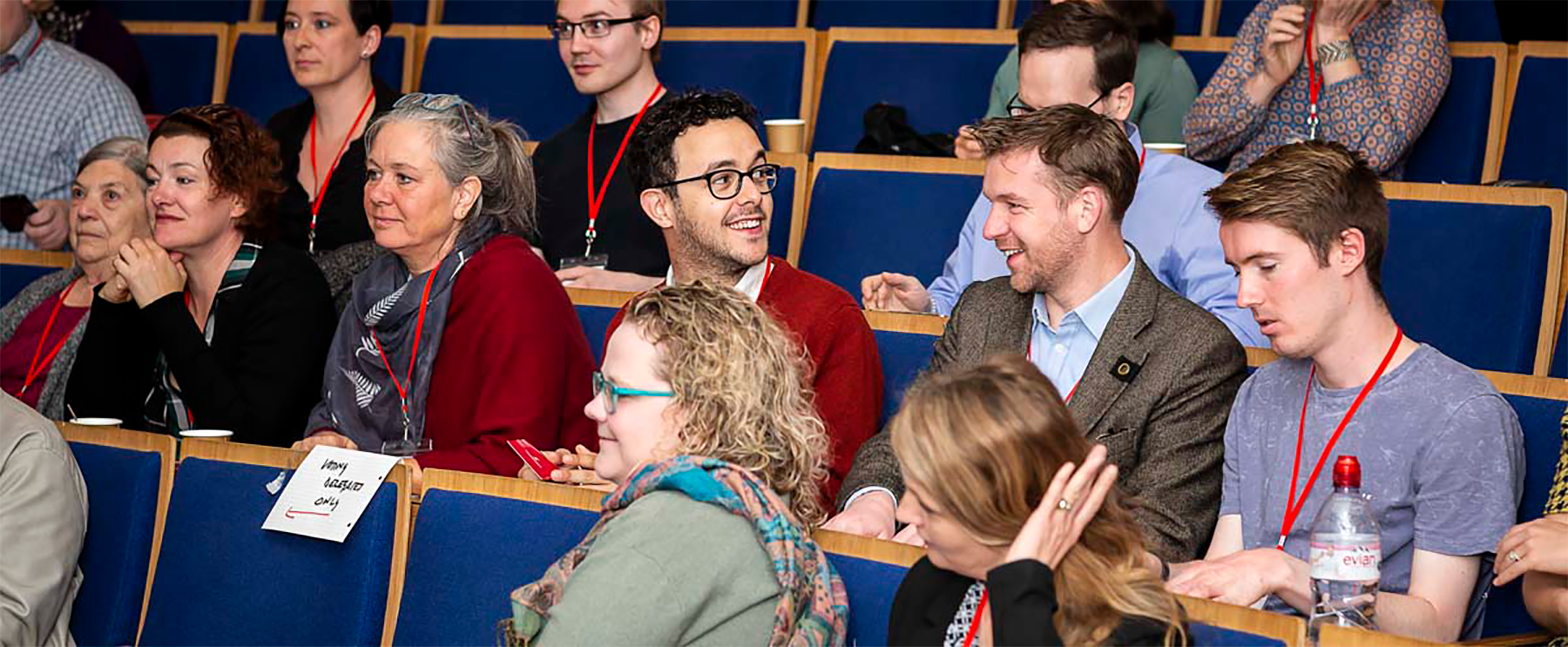
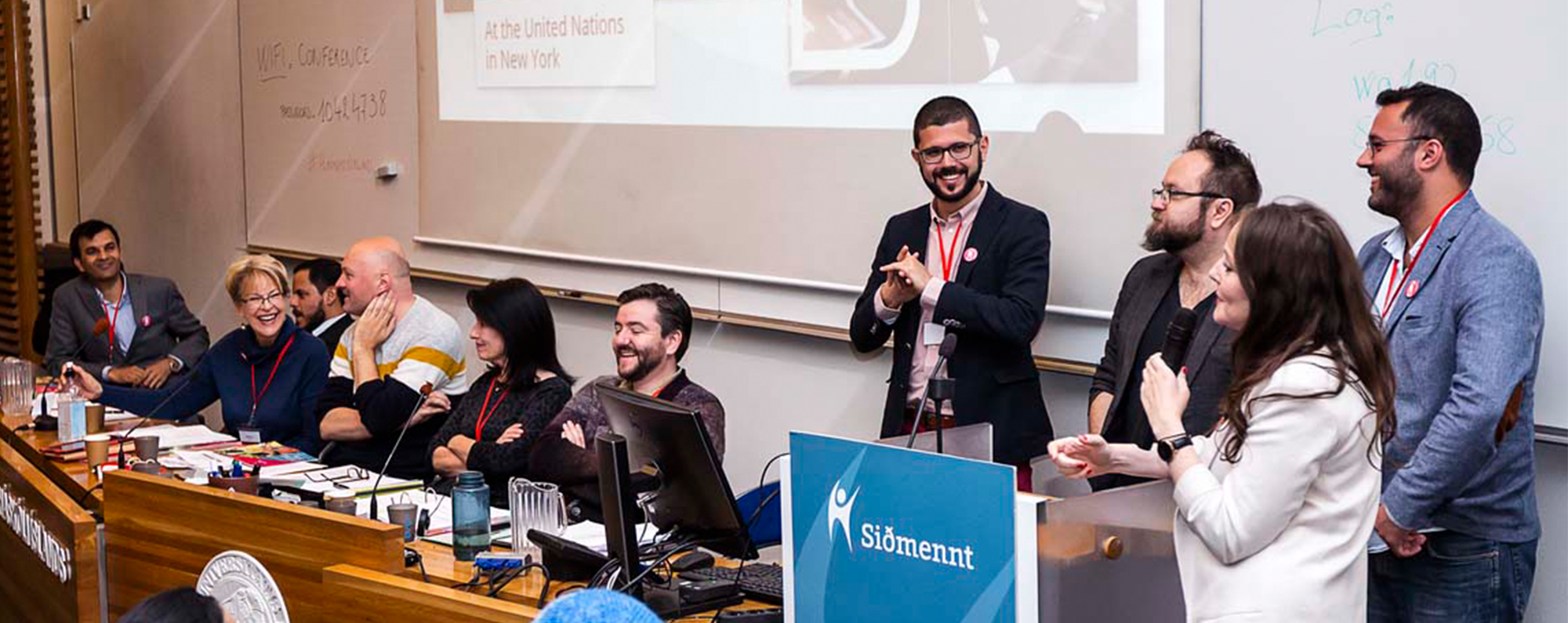

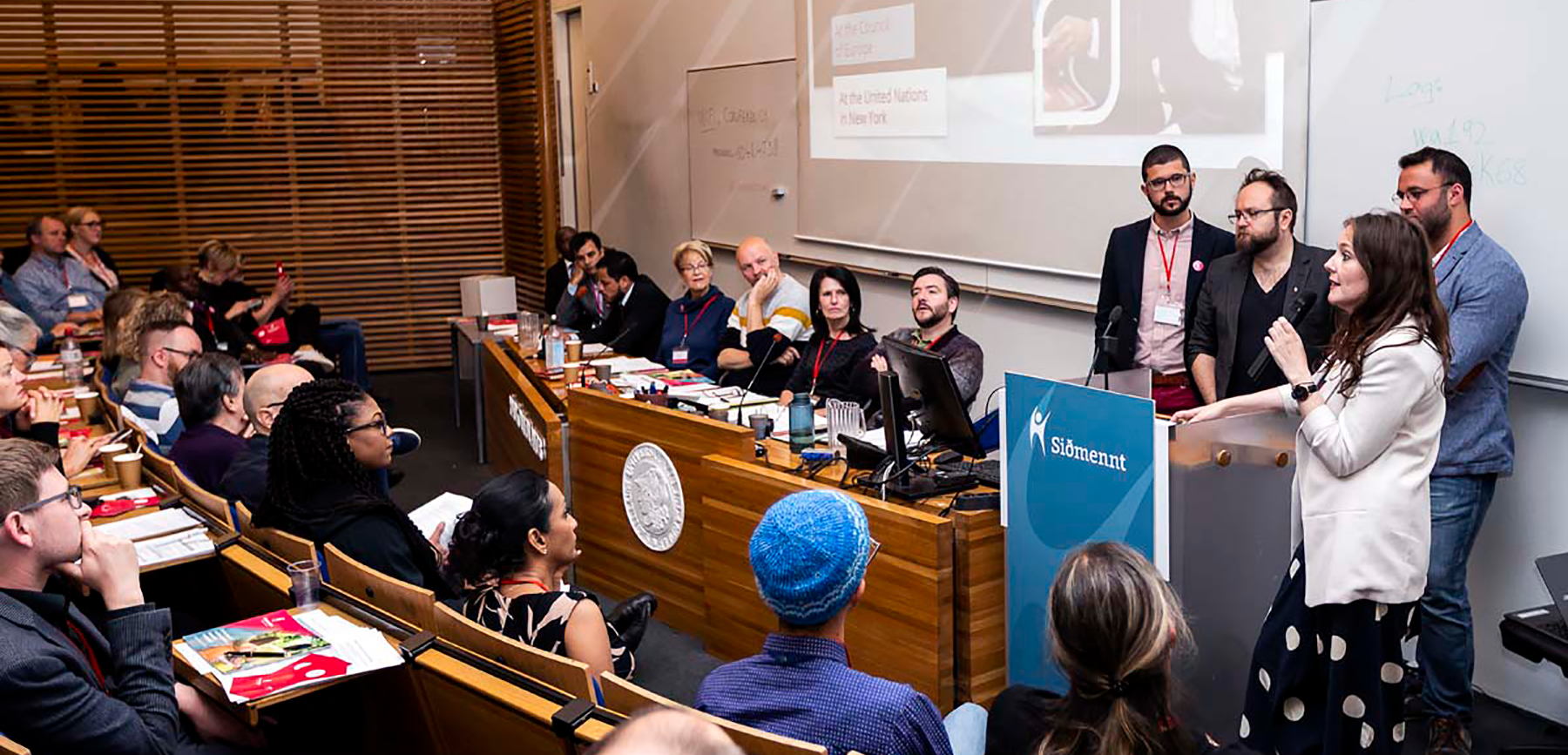
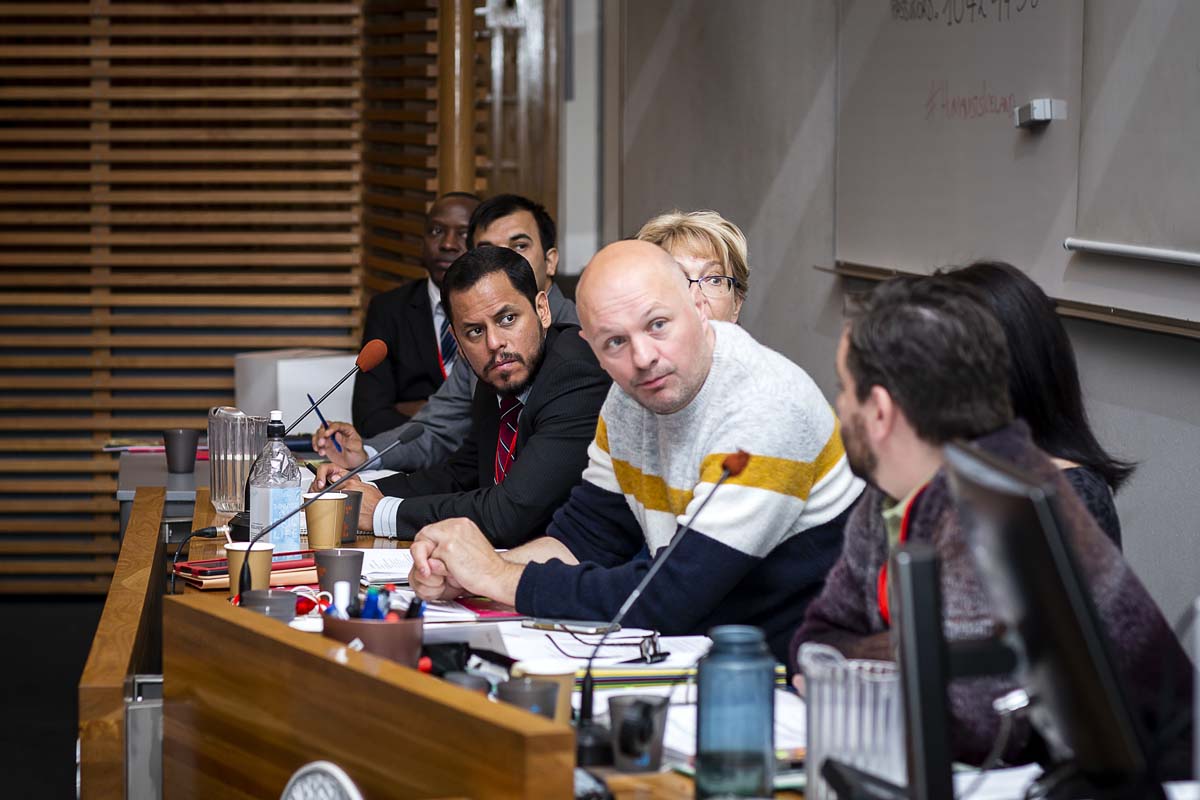
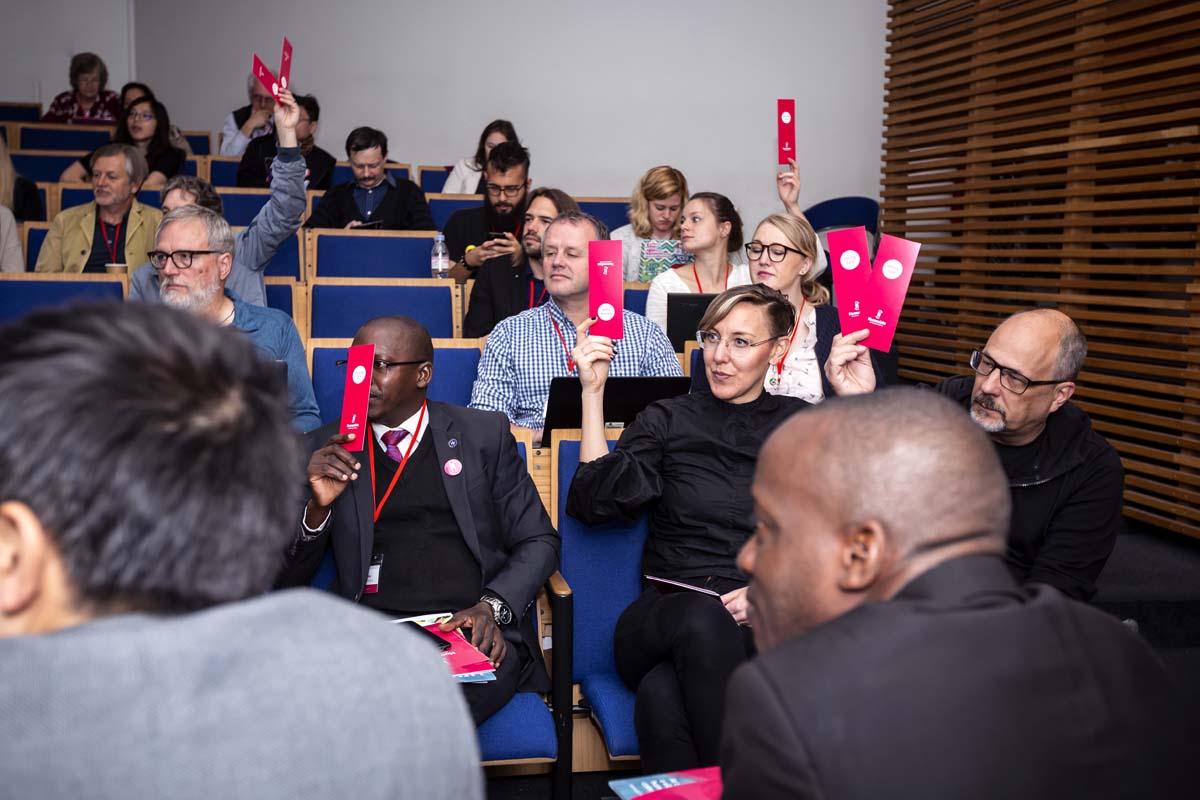

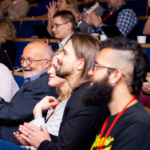
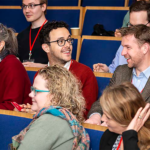
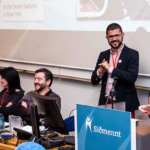

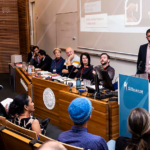

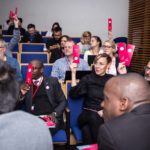
The General Assembly (GA) is the policy making body of Humanists International. It is made up of representatives of Members and Associates , and Humanists International Board members. The Board calls a General Assembly at least once in each calendar year. It is an occasion for discussion debate, Board elections, and the making of awards.
Usually the GA is held in conjunction with a conference of the national Humanist organization in the host country. Every three years this is a World Humanist Congress.
The 2025 Humanists International General Assembly will take place in Luxembourg from 4 to 6 July 2025, hosted in collaboration with AHA Luxembourg. Visit our event page for more information.

The first World Humanist Congress took place in Amsterdam, on 22-27 August 1952. The Congress was attended by more than 200 participants that came together to discuss the theme of “Humanism and Ethical Culture”. The largest delegations came from the five founding organizations, namely the American Ethical Union, American Humanist Association, Humanists UK (formerly known as British Humanist Association), Vienna Ethical Society and the Dutch Humanist League.
The assembly passed five resolutions. The first resolution was the founding document of Humanists International (known as the International Humanist and Ethical Union before 2019). The second declaration passed was the Amsterdam Declaration, a document stating the fundamental principles of modern, ethical humanism. While assembled, Humanists International also applied for NGO status at UNESCO and pledged its support to the Universal Declaration of Human Rights and other UN conventions. The last two resolutions addressed the world population problem.
The second World Humanist Congress was held in London, on 26-31 July 1957. More than 300 participants from 22 countries gathered to discuss the organization’s view on philosophy, personal and social life, and the organization’s mission.
The Congress adopted a resolution on nuclear weapons, stating that new thinking was needed to sort out the unprecedented situation.
The third World Humanist Congress was held in Oslo. Norway, on 2-7 August 1962. Around 450 people attended the Congress, with the theme “In Search of Long Range Goals for Humanism”.
The congress issued resolutions calling for a new perspective of international life, supporting the Food & Agriculture Organization’s “Freedom from Hunger Campaign”, and one regarding a world policy.
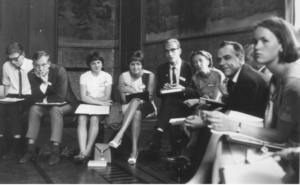
Participants at the 1966 World Humanist Congress
Humanists International’s (known as the International Humanist and Ethical Union before 2019) fourth World Congress, held in Paris, on 25-30 July 1966, was themed “The Humanist Response to the Problems and Aspirations of Man”.
The Congress adopted the Paris Statement, a document listing ten characteristics of what humanism stands for. The document was not intended to serve as the absolute definition of humanism, because humanism is too complex and dynamic for that.
A resolution, congratulating UNESCO on its 20th anniversary, and promising that Humanists International will continue to promote the aims and ideals of UNESCO, was also passed.
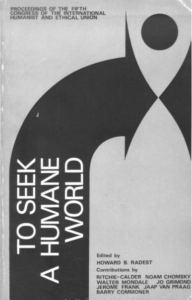
A book cover of “To Seek a Humane World”
The fifth World Humanist Congress was held in Boston, USA on August 4-9, 1970, and it was the first to be held outside of Europe.
The theme of the Congress was “To Seek a Humane World”. Affected by the youth protest movement and concerns about the environment, the discourse was focused on social issues of that time.
The Congress congratulated the United Nations on its 25th anniversary and pledged that Humanists International (known as the International Humanist and Ethical Union before 2019) will continue to assist the UN in implementing the aims stated in the UN Charter. A resolution on human rights, affirming Humanists International’s commitment to work for the implementation of the Universal Declaration of Human Rights was also passed.
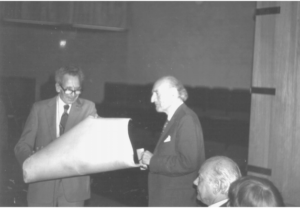
IHEU founding member Harold John Blackham receiving the 1974 International Humanist Award from Chairperson Jaap van Praag at the Congress in Amsterdam
On August 5-9 1974, Humanists International (known as the International Humanist and Ethical Union before 2019) held its sixth World Humanist Congress in Amsterdam, the Netherlands, where over 400 participants from 19 countries met to discuss “The Humanist Revolution”.
Some of the resolutions issued were country-specific, like the one regarding the pressures and restrictions put upon humanists in the Former Yugoslavia, and one that condemned the overthrow of the elected government in Chile.
Others expressed support of UN initiatives, like the one about the first World Population Conference in Bucharest, Romania, and the declaration of 1975 as the International Women’s Year. The Congress also ratified a resolution rejecting the use of any form of torture and other cruel, inhuman or degrading treatment or punishment, and requesting that member organizations urge governments to ratify UN conventions containing provisions prohibiting torture.
Resolutions on voluntary euthanasia, and one honoring Benedict de Spinoza, a forerunner of humanist philosophy in modern time, were also passed.
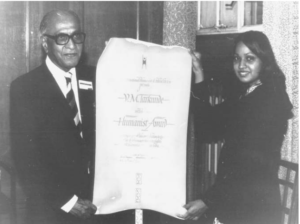
Vithal Mahadeo Tarkunde receiving the 1978 International Humanist Award
On July 31 – August 4, 1978, Humanists International (known as the International Humanist and Ethical Union before 2019) assembled in London for the seventh World Humanist Congress on “Work for Human Needs in a Just Society”.
Several speakers touched upon subjects like the full democratization of society, reducing the scale of production, and a change in our attitudes towards nature.
While assembled in London, the Congress passed a statement about human rights, calling upon various governments to correct their violations of human rights. Resolutions on limiting population growth, women’s rights to equality and the freedom to choose, and one welcoming the scientific breakthrough that made it possible for conception outside the womb, were also passed.
The Congress also voiced its concerns regarding the growth of neo-fascism in Europe and the USA.
The eight World Humanist Congress was held in Hanover, Germany on August 1-5, 1982, where more than 200 humanists met to discuss “Anti-Humanist Trends: Challenge and Response”.
The Congress passed the resolution Growth of Anti-humanist Trends, expressing concerns for the attacks on humanism by various dogmatic, ideological and fundamentalist forces. The assembly also passed a resolution on homosexuality, stating that freedom to shape one’s existence, also concerning sexuality, is one of the fundamental human rights.
Other resolutions adopted were the one about young people, police behavior in Nuremberg, the elimination of arms supplies that threaten the existence of humankind, and one stating that PLO members arrested by Israeli Defence Forces should be treated according to the Geneva Convention.
The Congress also committed Humanists International (known as the International Humanist and Ethical Union before 2019) to develop all programs with an inter-generational approach, to enhance the present and future lives of all, including aging human beings.
The position of an International Ombudsman was created by the Congress as a means to counteract violations of human rights and liberties, particularly of people who were not members of a church or other houses of worship.
Humanists International’s (known as the International Humanist and Ethical Union before 2019) ninth World Congress took place in Oslo, Norway on August 2-7, 1986. The theme of the Congress was “Humanists say Yes to Life”. More than 500 people attended the Congress.
The Congress ratified a statement on sexual exploitation of children, and one expressing Humanists International’s support of the United Nations’ proclamation of 1986 as the International Year of Peace. The Congress also expressed concern for the escalating international tension and advocated for international solidarity. Humanists International also urged the immediate stopping of all nuclear arms testing.
The 1986 World Humanist Congress expressed its support to those nations that had already imposed economic boycotts against South Africa, and urged other states to take appropriate actions against apartheid in South Africa.
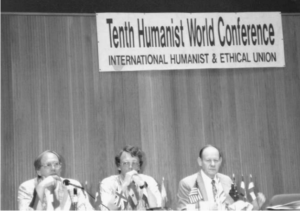
The Chairman Troika at the 1988 Congress in Buffalo, USA.
The tenth World Humanist Congress, with the theme, “Building a World Community: Humanism in the 21st Century”, took place in Buffalo, the USA on July 31 – August 4, 1988.
Over 1300 people gathered in Buffalo for five days, discussing the ethical issues facing humanity in the 21st century.
The assembly welcomed the improvement of relations between the USA and the USSR with the resolution The Soviet Union and Détente and passed a resolution advocating the necessity of a total ban of nuclear tests.
Humanists International (known as the International Humanist and Ethical Union before 2019) held its eleventh Humanists World Congress in August 1990, in Brussels, Belgium. The theme of that year’s Congress was “The Secularization of Society on the basis of: Liberty, Equality and Fraternity.”
The keynote speakers addressed the tasks humanists faced to achieve the full realization of the ideals of the 1789 French Revolution, the use of tolerance and intolerance as parameters of political culture, and the threats to women’s rights because of religion.
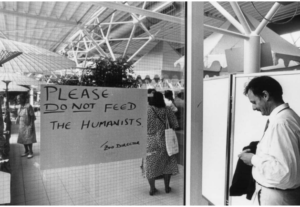
The 1992 World Humanist Congress at Artis Zoo in Amsterdam, Netherlands
The twelfth World Humanist Congress took place on 26-30 July 1992, in Amsterdam, the Netherlands, where more than 400 participants shared their thoughts on the theme “Humanism for head and heart”. That year’s Congress marked the 40th anniversary of Humanists International (known as International Humanist and Ethical Union before 2019).
The participants attended sessions about Humanist Services, like counseling and services related to birth, coming of age and death, and Humanist education in schools.
The Congress ratified policy resolutions on Human Rights and Development and one about peace. The former declared Humanists International’s support of human rights conventions adopted by the United Nations, and other international organs, while the latter promoted world peace.
While assembled, the Congress passed two country-specific resolutions, the first one was in regards to Poland’s restrictive anti-abortion law, and the growing influence of the Catholic Church on the Polish Parliament. The second one condemned Northern Ireland’s new syllabus for religious education for its exclusive, obsolete nature. A resolution about the Balkans was also passed that called on the leaders of the states formerly known as Yugoslavia to cease their active hostilities and seek peaceful political means instead.
Statements condemning the Vatican’s pronouncement about lesbian and gay rights and one assuring that Humanists International (known as the International Humanist and Ethical Union before 2019) will incorporate women’s issues in plenary sessions were adopted.
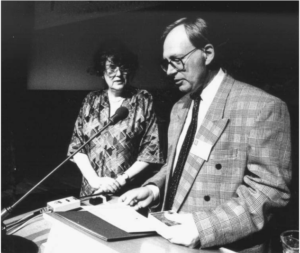
Nettie Klein receiving the 1996 International Humanist Award by Levi Fragell at the Congress in Mexico.
The Thirteenth World Humanist Congress was held in Mexico City, November 14-19, 1996. Humanists from around the world came together to discuss the theme “Global Humanism for the Cyber Age.”
There were sessions on “The Infomedia Revolution: Opportunities for Global Humanism”, “Humanist Values, Cyber-age and the Third World” and one on “How to Encourage Secularism in the Middle East in the Cyber-age”.
The fourteenth World Humanist Congress took place in Mumbai, India, January 10-14, 1999. The theme of the Congress was “Humanism for Human Development and Happiness.”
The Congress passed a policy resolution on the caste system in India and encouraged Indian legislators to amend the constitution to abolish the caste system – not just untouchability.
The 14th World Humanist Congress affirmed its stand on euthanasia, urged Humanists to donate organs after death, and pledged to endorse, defend and promote gay, lesbian, bisexual and transgendered people’s human rights.
The fifteenth World Humanist Congress was held in Noordwijkerhout, the Netherlands, July 3-6, 2002. The event, which also marked the 50th anniversary of the Amsterdam Declaration of 1952, was hosted by the Dutch Humanist League.
The theme of the Congress was “All different – all equal: human diversity, human rights, humanism”
The Congress unanimously passed a resolution known as The Amsterdam Declaration 2002, updating the original declaration of 1952, which states the fundamentals of “modern, ethical humanism”. This document is the official defining statement of World Humanism.
The 2003 General Assembly was held in Washington DC, USA.
The first-ever General Assembly meeting in Africa took place in Kampala, Uganda on 27-28 May 2004.
There were several events organized during the week-long gathering in Kampala.
Young Humanists International (formerly known as International Humanist Ethical Youth Organization) held a conference about “Global Humanism for Peace and Social Justice” and Humanists International (known as the International Humanist and Ethical Union before 2019) sponsored a conference on “Humanist Vision for Africa”, then formally launched the African Humanist Alliance.
In a bid to support the right to sexual autonomy of all individuals, the General Assembly passed a resolution urging all African governments – especially those of Uganda, Kenya, Tanzania, Nigeria, Zimbabwe and Zambia – to respect the rights of all people to sexual autonomy and privacy, eliminate all discrimination against their citizens on grounds of their gender or sexual orientation, and to decriminalize homosexual activity between consenting adults.
The sixteenth World Humanist Congress took place in Paris, France, on 5-7 July 2005, hosted by Libre Pensee Francaise.
The theme of the Congress was “Separation of Religion and State” marking the centenary of the 1905 French Law of Separation of Church and State. Libre Pensee Francaise played a crucial role in achieving the landmark legislation.
There were special sessions on the margin of the Congress on science and secularism, the European Union and on women’s issues.
The Congress unanimously passed The Paris Declaration on state secularism and further stated that the humanist movement must make renewed efforts to support comprehensive secularism in all countries.
A statement that condemned the 7 July London Bombing and terrorism and violence in the name of religion, was also issued.
The 2006 General Assembly was held in New York City, USA, on April 20th, 2006.
A seminar on PR and media relations was organized for Humanists International’s (known as the International Humanist and Ethical Union before 2019) member organizations, as well as a one-day visit to the Institute for Humanist Studies.
Humanists International’s (known as the International Humanist and Ethical Union before 2019) 2007 General Assembly was held in Torino, Italy on 17-18 June.
The focus of the 2007 Assembly was the campaigning and lobbying activities of the international humanist movement.
The seventeenth World Humanist Congress took place in Washington DC, June 6-8, 2008, and was hosted by The American Humanist Association. The congress was centered around the theme “E Pluribus Unum: Reclaiming Humanist Values”.
The General Assembly took place on the margins of the Congress, with sessions about the Human Rights Council and the Islamic States, NGO involvement in UN processes, and Humanists International’s (known as the International Humanist and Ethical Union before 2019) work in Africa.
The General Assembly ratified the resolution Threats to the Status of Science and Social-humanistic Disciplines in Education, with a list of recommendations regarding the distinction between religious and scientific information. A resolution supporting the worldwide efforts to abolish the use of corporal punishment to discipline children was also adopted.
Humanists International’s (known as the International Humanist and Ethical Union before 2019) 2009 General Assembly was held in London on 5th and 6th June.
The Assembly adopted new Bylaws for the organization. One of the goals of the revision was to give member organizations from developing countries more influence at the General Assembly.
Humanists International also organized the first “World Conference on Untouchability” on the margins of the General Assembly, with the support of Humanists UK (formerly known as British Humanist Association) and South Place Ethical Society. The conference brought together nearly a hundred politicians, academics and grassroots leaders to share successful strategies to combat caste discrimination. A declaration calling on states to outlaw the practice and strengthen UN enforcement mechanisms was passed.
The 2010 General Assembly was organized in Brussels, Belgium on August 6, 2010, at the offices of Centre d’Action Laique – a Humanists International (known as the International Humanist and Ethical Union before 2019) member organization.
The Assembly passed a policy resolution on Education in Schools, promoting objective lifestance education (including Humanism), intellectual honesty, and critical skills essential for individual engagement with society and politics.
The eighteenth World Humanist Congress took place in Oslo, Norway, on 12-14 August 2011.
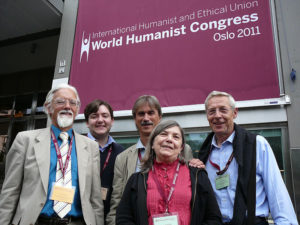
Delegates at the 18th World Humanist Congress in Oslo, Norway.
The theme of the Congress was “Humanism and Peace” and the speakers included HRH Crown Prince Haakon of Norway, and Professor Johan Galtung – the Norwegian sociologist who founded the discipline of Peace and Conflict Studies.
The Congress adopted the resolution on Pastoral Support of Non-religious Military Personnel, calling upon states that provide support for religious personnel, veterans and their families through the provision of chaplains to make Humanist equivalents available to non-religious personnel.
A statement about corruption, calling on actions and the implementation of a coherent and comprehensive strategy against corruption was also passed.
The Congress also passed the Oslo Declaration on Peace, committing Humanists to work for a more peaceful world.
The 2012 General Assembly took place in Montréal, Canada, from August 3 to 5, 2012.
The conference “Sex and Secularism” hosted by Humanist Canada and Association humaniste du Québec and sponsored by Humanists International (known as the International Humanist and Ethical Union before 2019), took place on the margins of the General Assembly. Topics covered at the conference included humanism and the rights of women, religion’s war on women and sex, and why humanism and the LGBT movement are growing together.
Representatives from Humanist organizations around the world met in Bucharest, Romania, 24-26 May 2013 for the annual General Assembly.
Keynote speakers included the American science and atheism blogger PZ Myers and British psychologist Richard Wiseman.
The Romanian Humanist Association, Asociația Umanistă Română (RHA), hosted a conference on “Education, Science and Human Values”, where the necessity of secularism in Romania was discussed. The European Humanist Federation and Young Humanists International (previously known as International Humanist and Ethical Youth Organisation) held their annual General Assemblies, on the margins of the conference.
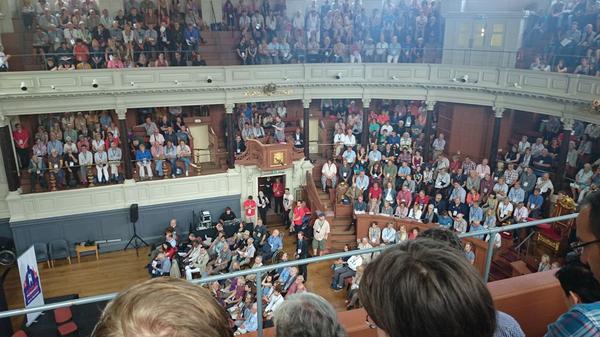
Humanists International’s (known as the International Humanist and Ethical Union before 2019) member organizations met in Oxford,UK on the 8-10 August 2014, for the nineteenth World Humanist Congress. The event was hosted by Humanists UK (formerly known as The British Humanist Association).
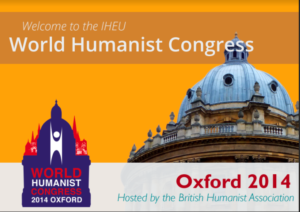
Poster for the 19th World Humanist Congress held in Oxford, UK.
The theme was “Freedom of Thought and Expression” and over 40 events with over 70 speakers took place.
The keynote speakers were Nobel prize winner and playwright, Wole Soyinka, UN’s Special Rapporteur on Freedom of Religion or Belief, Heiner Bielefeldt, and award-winning author, Phillip Pullman.
While gathered in Oxford, the Congress adopted the Oxford Declaration on Freedom of Thought and Expression, committing the organization to uphold and promote existing rights to freedom of thought and expression within the international human rights framework.
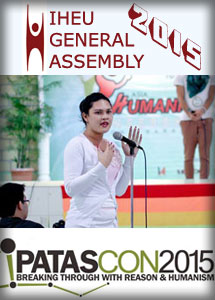
A poster for the 2015 General Assembly held in the Philippines.
The 2015 Humanists International (known as the International Humanist and Ethical Union before 2019) General Assembly was held in Manila, the Philippines on 30 May 2015, hosted by the Philippine Atheists and Agnostics Society.
During this General Assembly, the General Statement of Policy was passed. The policy is based on policy resolutions and statements adopted and issued by Humanists International between 1952 and 2014.
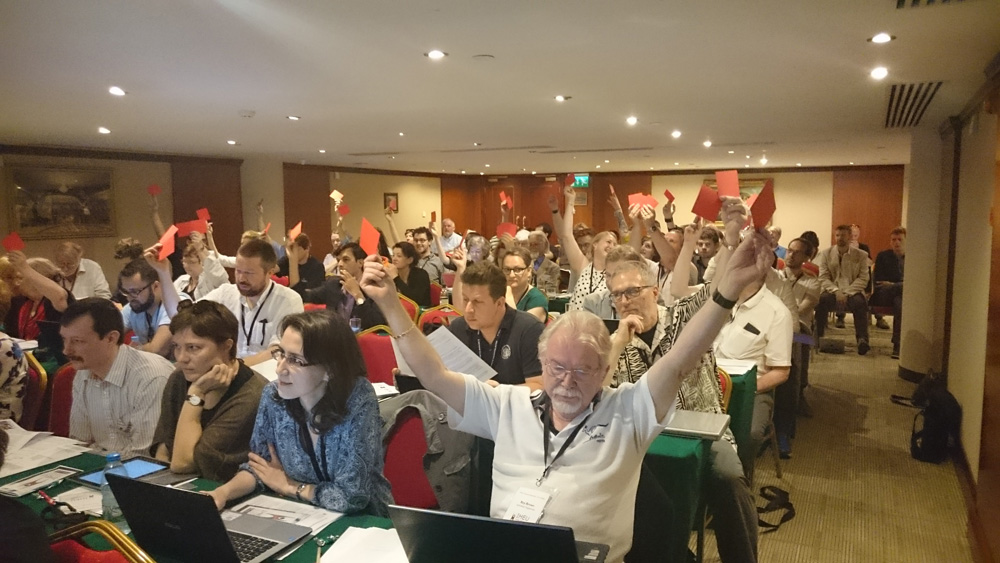

A poster from the 2016 General Assembly in Malta.
The 2016 General Assembly of Humanists International (known as the International Humanist and Ethical Union before 2019) was held in Valletta, Malta on 22 May 2016.
At the 2016 General Assembly, major reforms to the Board were introduced. The Board was expanded from 6 to 9 members, with measures to ensure that the new members are globally diverse.
The General Assembly voiced its concerns regarding the situation for the Rohingyas and condemned the violation and denial of human rights for the Rohingya people.
The situation in Iraq and Syria was also on the agenda. The General Assembly condemned the use of religion to justify the violation of human rights, and legitimize violence, terrorism and war, and entreated UN member states and national governments to increase their efforts to search for a peaceful solution to the crisis.
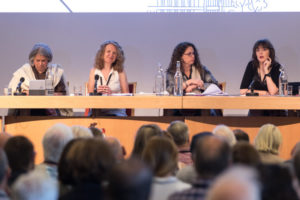
Panelists at the conference included (left to right) secular activist Gita Saghal, journalist Joan Smith, UN Special Rapporteur in the field of cultural rights Karima Bennoune, and IHEU Director of Advocacy Elizabeth O’Casey
The 2017 General Assembly of Humanists International (known as the International Humanist and Ethical Union before 2019) took place on 6 August 2017 in London, as part of a weekend of events hosted by Humanists UK (formerly known as the British Humanist Association).
This event was arranged quickly by Humanists UK following the cancellation of the planned Congress in Brazil.
The General Assembly passed the London Declaration on Secularism, committing Humanists International to uphold and promote the secular approach to the State and to build a greater understanding of secularism’s principles and benefits.
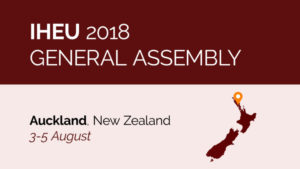
A poster from the 2018 General Assembly.
The 2018 General Assembly took place on 5 August 2018 in Auckland, New Zealand, as part of several events hosted by the Humanist Society of New Zealand.
The General Assembly approved The Auckland Declaration Against the Politics of Division, which addressed the resurgence of so-called “strongman” politics, anti-human rhetoric, and especially the demonization of minorities for political gain.
An emergency motion brought by the Board in response to the US “Potomac Declaration” was also approved, which broadly welcomed the growing international interest in “freedom of religion or belief”, with a mandate to engage in some of the more problematic languages of the Potomac Declaration.
The General Assembly reassured its commitment and support to the Protection of the Rights of Lesbian, Gay, Bisexual, Trans*, Intersex, Queer and Asexual (LGBTI+) Persons under The Universal Declaration of Human Rights.

The 2019 Humanists International General Assembly took place on 2 June 2019 in Reykjavik, Iceland, hosted by Siðmennt, The Icelandic Ethical Humanist Association.
The General Assembly was held in conjunction with the General Assemblies of the European Humanist Federation, Young Humanists International and alongside a conference organized by the Icelandic Ethical Humanist Association about the ethical questions of the 21st century.
Delegates from around the world discussed and approved a new Reykjavik Declaration on the Climate Change Crisis, and approved changes to the Humanists International membership structure, designed to increase democratic participation from newer humanist organizations.
The General Assembly also approved the Reykjavik Declaration on the Family and Human Rights: A Humanist Perspective, which addresses the rising opposition to key fundamental rights in the sphere of family law and family policies.
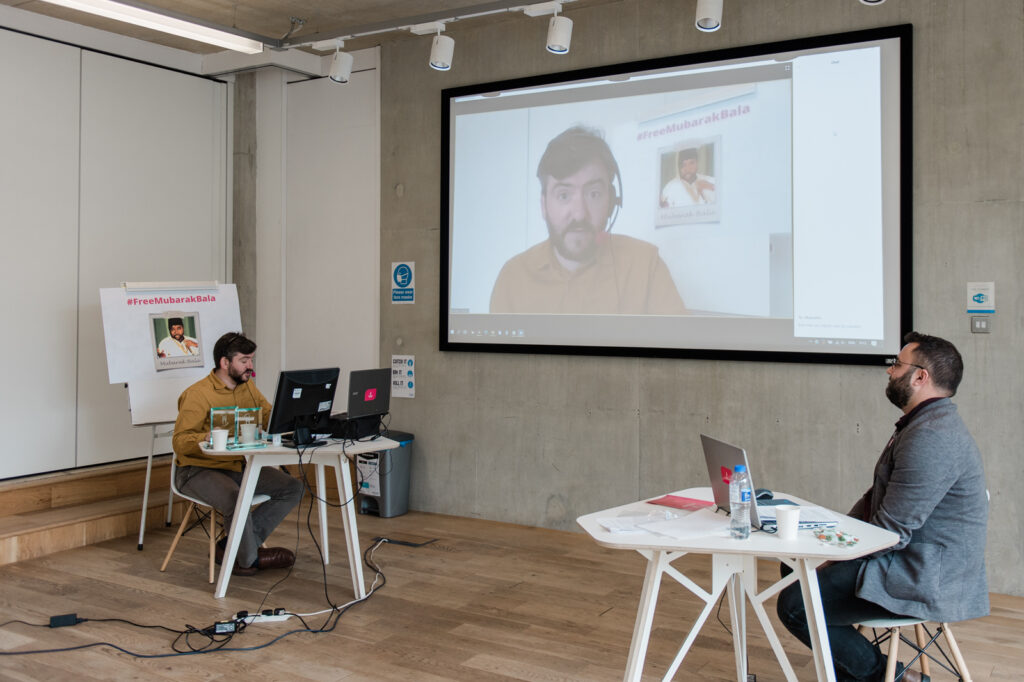
Due to the COVID-19 pandemic, the planned World Humanist Congress in Miami, USA had to be cancelled.
In light of this, the business of the General Assembly was split into two. With the accounts and minutes being approved by email correspondence, and the election of Board members and awards taking place in a live online General Assembly on 16 October 2020.
At the General Assembly Anne-France Ketelaer was re-elected as the Vice-President of Humanists International, and Anya Overmann was elected as the President of Young Humanists International. They will be joined on the Board by Dr Leo Igwe and Debbie Goddard who join the Board for the first time as general members.
Marieke Prien, the outgoing President of Young Humanists International received a commendation for her work leading the international humanist youth section since her election in 2016.
The following three people were awarded the 2020 Distinguished Service to Humanism Award: Dr. Sudesh Ghoderao, Bert Gasenbeek and Becky Hale.
Read the full report on the General Assembly here.
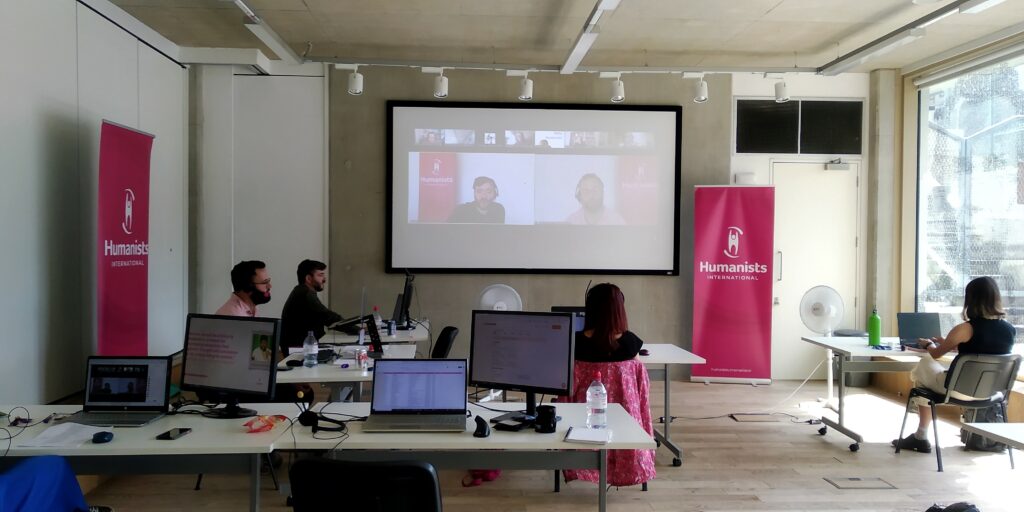
Following the cancellation of the General Assembly in Kathmandu, Nepal, due to the ongoing COVID-19 pandemic, Humanists International held two General Assemblies in 2021:
Over 80 delegates from across the world attended the event.
The General Assembly unanimously voted to approve two new resolutions:
A full report of the General Assembly can be found on our website.
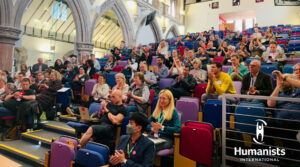
On 5 June, over 80 delegates from around the world took part in Humanists International’s General Assembly 2022, the first in-person gathering at Humanists International since the pandemic started.
The Assembly also approved the Declaration of Modern Humanism
Full details about the General Assembly can be read here.
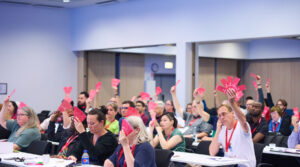
From 3rd to 6th August 2023, over 400 delegates from 43 countries took part in the World Humanist Congress, the first in-person Congress to take place since 2014.
During the Congress, the delegates discussed and adopted a new declaration on “Democracy: a humanist value”, which was later adopted by the General Assembly. The General Assembly also passed a more timely resolution, referring to the challenges to democracy around the world at the present time. During the General Assembly, an emergency resolution was proposed by Humanists UK, in conjunction with several Indian delegates, on the restoration of armed protection for Prof. Narendra Nayak.
Read the full report of the 2023 World Humanist Congress here.
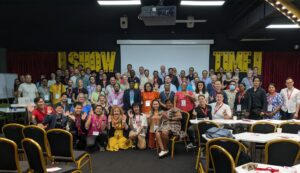
On 1 September 2024, over 70 humanist delegates from more than 30 countries attended the annual General Assembly of Humanists International in Singapore.
During the General Assembly, which took place the following day, Members and Associates elected new Board Members and ratified new humanist organizations.
Full details about the General Assembly can be read here.